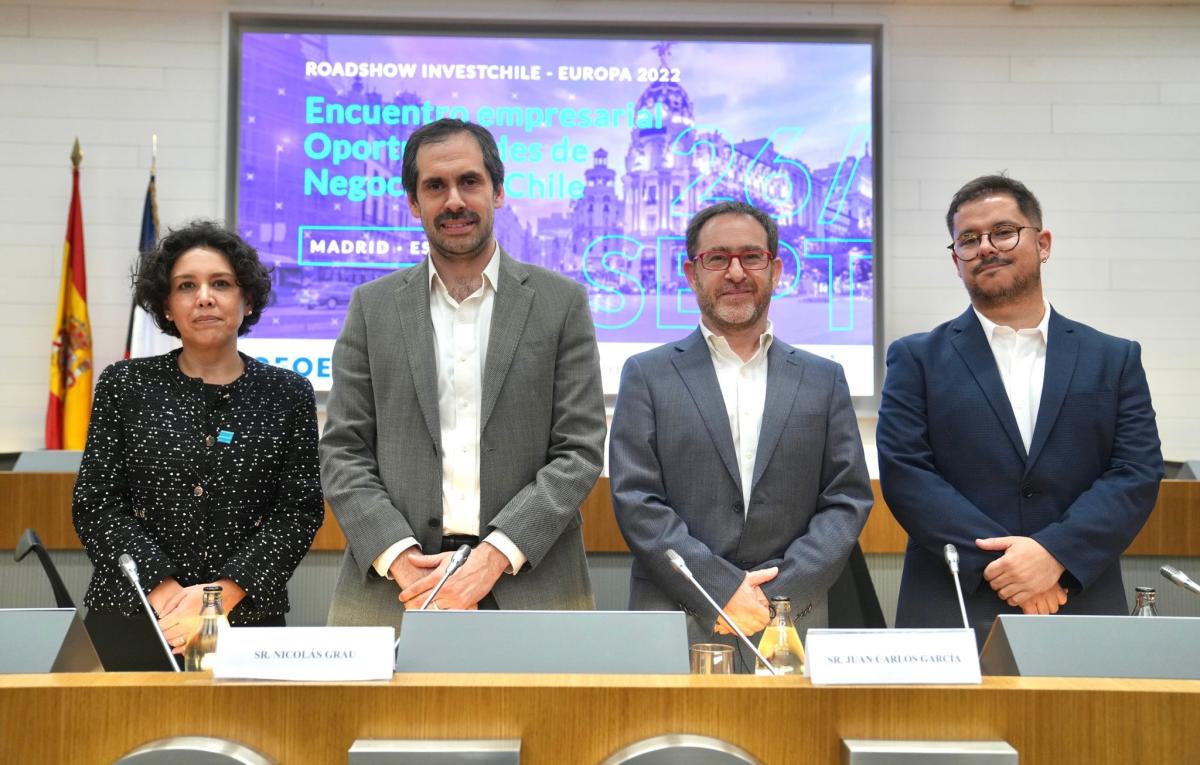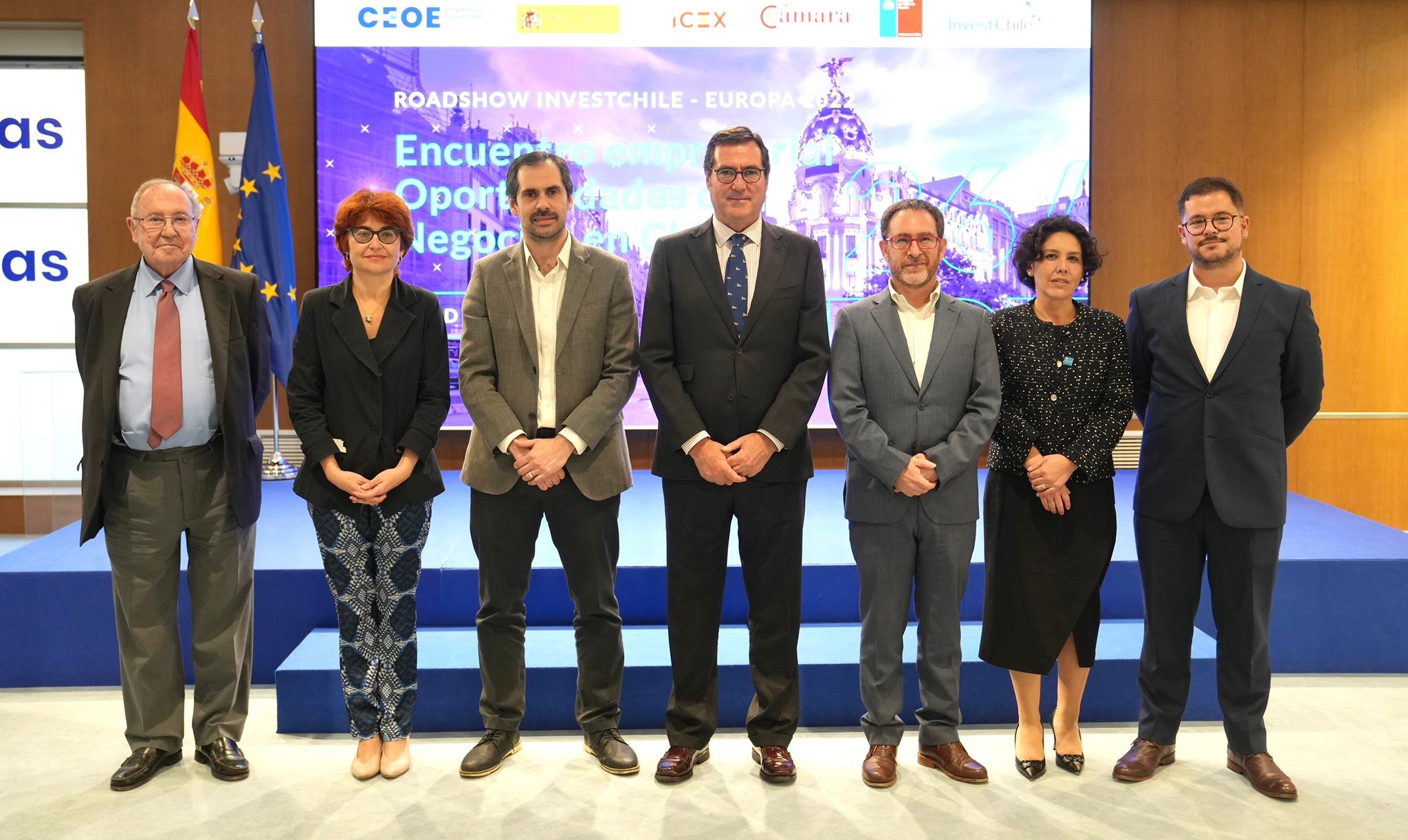Chile’s Ministers of Economy and Public Works set out business and investment opportunities in the country
During a business meeting organised by the CEOE, the Secretary of State for Trade, through ICEX, and the Spanish Chamber of Commerce, in collaboration with the Embassy of Chile in Spain and InvestChile.

The Chilean Ministers of the Economy, Development and Tourism, and of Public Works, Nicolás Grau and Juan Carlos García, respectively, set out the business and investment opportunities that exist in their country, during a business meeting organised by the CEOE, the Secretary of State for Trade, through ICEX, and the Spanish Chamber of Commerce, in collaboration with the Chilean Embassy in Spain and InvestChile. The conference was used to learn first-hand about their Government’s priorities and the current situation in the country, as well as the measures adopted and the projects that are due to be implemented in Chile.
The event was opened by the president of the CEOE, Antonio Garamendi; the CEO of ICEX, María Peña; and the President of the Spanish Chamber of Commerce, José Luis Bonet. Later, to discuss business opportunities and the importance of strengthening relations between Spain and Chile as strategic allies, the Chilean Minister of Public Works, Juan Carlos García, presented the portfolio of public infrastructure investment projects; the Chilean Minister of the Economy, Development and Tourism, Nicolás Grau discussed the prospects of the Chilean economy for investment by Spanish companies; and the Director of InvestChile, Karla Flores, assessed the role of the agency and how to accelerate business in the country. The panel was introduced by the Chilean Ambassador to Spain, Javier Velasco.
Social dialogue, public-private partnerships and business opportunities.
The President of the CEOE, Antonio Garamendi, stressed the importance of reaffirming the need to continue strengthening public-private partnership, the role of business organisations as interlocutors between governments and companies, and of enhancing social dialogue, bearing in mind that Chile is a potential market for our companies. The presence of the latter in Chile demonstrates its commitment and involvement in that country’s development and economy. In this connection, he highlighted “the global recognition of Spanish infrastructure companies, be it in engineering, design, construction, financing, operation or maintenance;” and he stressed their ability to adapt to global needs, form alliances and agreements with subcontractors and local suppliers. He also mentioned the competitive advantage enjoyed by Spanish companies in the field of water, management of water resources and green infrastructures, such as hydrogen.
On the other hand, Garamendi stressed the importance of Chile continuing to promote its strategy of international economic insertion or “open regionalism”, which operates on two levels: bilaterally, deepening bilateral relations, ratifying the modernisation of the Association Agreement the EU has had with Chile since 2002, and also with Spain’s contribution, through its forthcoming presidency of the EU; and multilaterally, promoting agreements within the framework of the WTO and the OECD, or regionally, in the Pacific Alliance itself. Garamendi also underlined the work being done to continue to strengthen our relations using tools such as the Chile-Spain Business Council, which was relaunched in 2019 and whose coordination is the responsibility of the CEOE, the CPC and SOFOFA. Finally, he also mentioned the great joint work we do using the best tool for regional integration in existence, namely the Ibero-American Heads of State and Government Summit and the previous Business Meetings, which on this occasion shall be held in the Dominican Republic in 2023.
The CEO of ICEX, for her part, said that “Chile is one of our main goods export markets in the Americas, and is also one of our largest suppliers in the region. Moreover, our agenda shares interests in the EU.” However, he pointed out, the main pillar underpinning relations between Spain and Chile is investment. Spain is the third-largest investor in Chile in terms of Foreign Direct Investment stock, behind only the United States and Canada, and Spanish companies also have diversified investments in multiple strategic sectors.
“In the technology field, one might say that in our programmes for attracting businesspeople we are noticing increased interest on the part of Chilean start-ups in expanding in Spain. Fracttal or the unicorn Betterfly are two examples, but not the only ones,” Peña insisted.
José Luis Bonet, the President of the Spanish Chamber of Commerce, highlighted Spanish companies’ high degree of commitment to the growth, employment and competitiveness of Chile, as well as their “interest in continuing to strengthen trade and investment relations that have traditionally been very intense, but which still have great potential for development”. José Luis Bonet recalled that Spain is the world’s third-largest investor in Chile, “we are united by the shared goal of guaranteeing that our societies enjoy prosperity based on fair, inclusive and sustainable economic growth, and this cannot be achieved without the help of companies”, he said.
The President of the Spanish Chamber of Commerce also underlined the importance of public-private partnership to achieving these shared objectives, as well as security, regulatory stability and a good level of dialogue with the authorities, “something that you, by your presence in Spain, are helping to reinforce”.
Spain and Chile: strategic allies
Chile’s Minister of Public Works, Juan Carlos García, reported on the Public-Private Partnership Infrastructure Plan 2022-2026, and announced the “Let’s Invest in Chile” Plan, which was presented on 12 September and which contained 6 areas of action and 28 initiatives. To objective is to strengthen and streamline public investment, to foster foreign investment, to improve the effectiveness of procedures in regulations and permits for projects and to enhance public-private partnerships for investment. “The works bring us closer to the people,” the Minister stressed. García insisted that PPPs must be bidirectional to offer certainty, to offer greater benefits to citizens and to be higher-quality.
Thus, the Chilean minister insisted that investment in itself is not enough: “it is necessary to connect the works with people through partnerships.” In fact, he reported that in the country they are gearing activities towards areas with great potential for the future, such as electromobility, the circular economy and social sustainability. García mentioned that a phenomenon of regionalisation is occurring, which involves regional authorities for the first time in history. We seek solutions that serve the community and, as far as possible, attempt to add innovation.
The Minister of Public Works stated that 108 contracts have already been awarded, with committed investments of around 27 billion dollars; the infrastructure deficit has been reduced and an appropriate environment for companies has been created. According to García, the Public-Private Partnership Infrastructure Plan 2022-2026 consists of 43 tenders and 52 projects, with an estimated investment of 13.258 billion dollars across four areas: water security, Chile’s Pan-American Highway and Accesses, a better airport service, and better cities, mobility and equipment. This whole process, he said, is accompanied by various complementary measures: the “Good Neighbour Programme” and the National Toll Policy, and a Directorate-General of Licenses Modernisation Agenda.
At the same time, the Minister of the Economy, Development and Tourism, Nicolás Grau, said that Chile has seen a very quick economic recovery after the crisis. It has responded to inflation with a large increase in the central bank’s interest rates and its fiscal policy has been strengthened. Regarding the political context, the Minister explained that after the mobilisations and protests of 2019, the country’s disillusionment was channelled into drafting a new Constitution. In fact, he pointed out, there is a fairly cross-cutting idea of what the document should include.
Grau also reported that a tax reform is already underway and is being debated in parliament, and that it seeks to reconcile economic dynamism with the Government’s commitment to carbon neutrality. He also stressed that Chile is very open to foreign investment, and now even more so thanks to the forthcoming modernisation agreement with the EU. It has a stable legal framework, free capital flows and a very favourable business climate. A fortnight ago, Grau said, an investment promotion plan was presented consisting of 18 measures and which includes tax incentives, such as creating a tax credit exchange that companies can access to reduce their taxes.
The Economy Minister underlined that Chile has a very robust, but rather complex, permit system. They are therefore going to focus on sectoral permits in the next two years, with a view to improving their organisation. Moreover, according to Grau, specialist roundtables are being set up in construction, energy, transport and mining, with strong public-private participation. Finally, the Minister reported that, by 2030, 70% of energy is expected to be renewable, and he bet on developing green hydrogen, bearing in mind that Chile has comparative advantages over other regions.
To close the day, the director of InvestChile, Karla Flores, highlighted the importance of this business meeting, as a starting point of the tour they are going to take in Europe. She praised the policy of attracting investment that is in operation and also emphasised the importance of training human capital. Flores stressed the strong presence of Spanish companies in various sectors and called for continued efforts to increase investment. Finally, he invited all those present to participate in the 6th InvestChile 2022 International Forum from 5 to 7 December, which will address global services, Fintech, venture capital, the circular economy, green hydrogen and tourism, among other issues.

Related news
A large delegation made up of Spanish business organisations and companies took part this Monday and Tuesday, 9 and 10 September, in two high-level meetings with representatives of the Chinese business world, as part of the official visit of the President of the Government, Pedro Sánchez, to the People's Republic of China.
Even though China is our main trading partner in Asia, Spanish companies still have a long way to go to take advantage of the great business and investment opportunities offered by the Chinese market.
The Ibero-American Secretary General, Andrés Allamand; the President of the CEOE, Antonio Garamendi, and the President of the Ibero-American Arbitration Centre-CIAR, Javier Íscar, inaugurate a conference at the CEOE on Ibero-American arbitration. They stress the importance of continuing to support arbitration as an effective and safe instrument for resolving disputes in the region.
Business and investment opportunities in Medellin and the Metropolitan Area were assessed for the Spanish companies with interests in the area.






